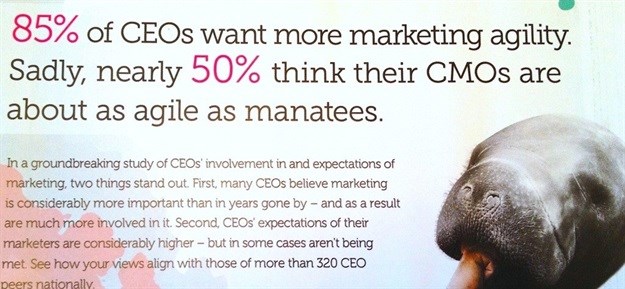
For many CEOs, the importance of marketing has increased significantly in recent years, as has their involvement and expectations. Unfortunately, in many cases CEO expectations are not being met by marketing.
How can the chief marketing officers change this for the best? What are the necessary lightning turnaround reflexes?
It all starts with the chief marketing officer's great (or not so great) leadership qualities and management abilities, which are reflected by the motivational levels and performance results of his/her marketing team.
Dangerous failures by marketing teams to deliver profits and returns on marketing Investment have deadly implications for your business. The business will literally die if it does not have steady leads, sustained sales, repeat business and continuous stream of new customers, which marketing teams are entrusted with generating.
Marketing teams need considerable insights, vision and leadership from the CMO. If the chief marketing officer, as a formidable business leader in the corporation, demonstrates half-baked marketing leadership to their marketing teams, with no real vision and insights, but only ill-considered ideas, he is as good as an absent chief marketing officer.
Here are some interesting numbers and CEOs’ views from the survey of 320 CEOs conducted by the Chief Executive Group and Stein IAS. The study examined the challenges and opportunities for today’s CMO from the perspective that matters the most – the CEOs’ views on marketing revealed that:

The study concluded that ”CEOs who are unhappy with marketing have no one to blame but themselves for creating or maintaining an untenable situation. ‘That is a failure of executive management including the CEO’.”
Marketing teams need the CMOs strong and decisive marketing leadership to set the tone for the high-performance marketing department that delivers higher VALUE, ROI and PROFITS.
A CMO must think like a CEO and perform as such. He must also think like a CMO, in the manner he is supposed to, and deliver as such. This is how you begin:
To get more done in a day, your marketing team must be mindful of everyday choices. Marketing team members who constantly identify and acknowledge their distractions, and take care to avoid them, achieve a great deal of work each day.
The never-ending search for ideas, creativity and productivity goes hand in hand with identifying and destroying marketing workplace attention destroyers. Attention and focus destroyers constantly creep up on marketers camouflaged as urgent work matters to be dealt with immediately. List the diversions and plot a strategy of avoidance. To add to your existing list of distractions, here are some of the most obvious productivity killers to avoid:
5. Great morale boosters for marketing teams: Motivate, inspire and offer 'Feel Good' rhetoric.
4. Align marketing team members to specific tasks through division of workloads.
Offer actionable, high-quality feedback. Pay personalised attention to individual marketers with specified individual tasks.
• Is your social media team connecting with audiences in social settings? Do they have strong social networks with the ability to spread the word quickly and authentically? Authenticity and engagement are key and people can tell if you’re checked out.
• What about your content marketing? Are your content marketers creating steady flow of outstanding and useful content of various types including blogs, articles, ebooks, infographics, Slideshares, etc.
• Mentor your email marketing team to grow your list of email subscribers who actually open and click on your emails.
• Coach your team on using metrics and get them interested in judging their own successes that way. It is absolutely vital to have strong understanding of all the metrics for inbound success.
• Lead your mobile marketing team in having guiding conversations about mobile marketing. Confront the shift to the mobile consumer head on by learning about how the best global organisations have adapted their marketing efforts for mobile devices. Lead and guide your team's discussion about mobile marketing evolution and how your team can:
• Have frank conversations about your customer engagements. Explore how your team understands your customers in today's hyper-connected world, and develop a team dialogue to effectively communicate with your customers. You could have the following as your talking points:
• On the job perpetual marketing training to improve marketing skills, competencies and aptitude.
• Offer your team useful daily tips on how to tackle certain challenges quicker, faster and efficiently.
• Stop the team from reinventing the wheel: Once you've cracked the code share secrets to success with the rest of the team to stop them from spending time trying to solve the same problem.
• You might want to reconsider your strategy of having way too many marketing experts in your marketing team, a balancing act is key. The greater the proportion of highly educated and experienced marketing experts a team has, the more likely it is to disintegrate into non-productive conflict or stalemate. Once again, you must manage a good balance of leading experts with some rising stars. You do not want constant conflict of colliding egos.
• Encourage the team to share market and marketing knowledge freely and to learn from one another.
• Collaborate and share marketing resources. View your marketing goals as compatible and push for one another to succeed rather than cannibalism.
• Shift workloads flexibly to break up unexpected bottlenecks. This helps other team members not to fall behind and fail, but rather to complete jobs on time and meet deadlines.
• Teach your team how to communicate well with each other, how to respect one another, how to build relationships, and how to resolve conflict creatively in a way that results in innovation rather than infighting.
• Foster a strong sense of family and community. Once individual team members feel that they belong, it is much easier for them to trust others, to reach out to others and more likely to share knowledge with others.
Clearly explain to your marketing team the outcomes and key results you want and why the business needs those profitable results. For each marketing objective set the following for individual marketers and the entire team:
• Set realistic goals.
• Set realistic targets.
• Set realistic deadlines.
• Set realistic metrics (Let the metrics crack the whip for you).
• Give consistent and timely actionable feedback, whilst coaching and mentoring in the process:
• Do not micro-manage. It is counter-productive to do so:
Yes, it’s not enough to set a goal and only wait for the outcome at the end of the month or a quarter. At the same time, you want to avoid micro-managing. Get out of the way. Rarely tell your team members what to do. Let them surprise you. Allow them to be creative. Let them show initiative. Let them be. There’s a big difference between micro-management and providing support, leadership, mentorship and getting your hands dirty at the right time and in the right place. Choose appropriate interventions rather than being a bit of a nuisance.
The fundamental reason for marketing's existence in an organisation, and the marketing team's permanent priority number one objectives are to:
Together with your marketing team, find a way to translate this number one marketing objective into specific decisions about the mix of marketing activities your team will pursue. Lead and coach your team to build models that facilitate the incremental impact that each of the following marketing variables will have on customer acquisition, customer attrition, lead generation, sales increment, revenue, profits and follow-on effect on the customer base. Lead and coach on the following:
Focus your team on customers, but in a way that is profitable in the long term. The cost of customer focus should not exceed customer's lifetime value. Isolate your team's marketing impact from that of other performance factors. When marketing performance is up or down relative to expectations, the marketing team should know the degree to which this is due to marketing versus external conditions. That knowledge places the appropriate level of accountability on marketing decision makers, so their performance is better connected to skill than to luck.
It is my strongly held belief that a real marketing powerhouse will always provoke equal amounts of admiration and fear from competitors! High performance marketing teams exist to shame their organisation's chief competitors whilst delivering intrinsic and tangible value to the CEO and Shareholders through achieving sustained market share, never-ending market leadership and unceasing market dominance.
